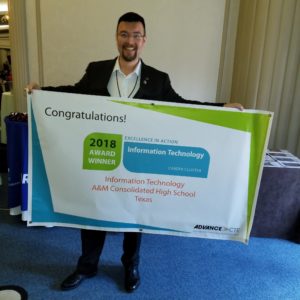Starting with the first day of the meeting, there was a sense of excitement about federal policy – our meeting began within two weeks of Congress’ passage of an omnibus appropriations bill for Fiscal Year 2018. With the first significant increase to the federal investment in the Perkins Basic State Grant in years (read more about this in Advance CTE’s statement), state leaders were eager to discuss how we could build on this momentum and move toward doubling the investment in Career Technical Education (CTE). Meeting attendees channeled this enthusiasm into thinking about how to leverage not only the federal investment, but also the Carl D. Perkins Career and Technical Education Act (Perkins) itself to advance a statewide vision for CTE.
The Maximizing Perkins to Advance Your State’s Vision for CTE panel featured state leaders who did just that – maximized Perkins to continuously improve CTE and move toward their statewide vision. In the workshops that followed, there was much discussion about how a statewide vision for CTE can kickstart important discussions with partners and stakeholders interested in CTE about student outcomes data, the quality of CTE programs and the degree to which learners have access to such programs. These themes came up often in policy conversations during the Spring Meeting – from the panel that focused on the Higher Education Act reauthorization to the session that featured Kara McKee, the Special Assistant to the President on Domestic Policy. Meeting participants also had the chance to bring up these ideas and more during the View from the Hill Panel, which focused on Perkins reauthorization. This was my favorite part of the Spring Meeting – seeing Advance CTE’s members share their stories and engage with staff for members of the Senate Health, Education, Labor and Pensions (HELP) Committee about their ideas and priorities for Perkins reauthorization!
Kathryn Zekus, Senior Associate, Federal Policy
I joined the Advance CTE team two years ago, in April 2016. Since then, Perkins reauthorization has been JUST around the corner. But state leaders don’t need to wait for a new bill to pass to re-envision how CTE can be delivered in their states. Imagine, Perkins was last authorized 12 years ago — predating Tesla, the iPhone and the Great Recession. State plans are long overdue for a refresh.
This year at the Spring Meeting, states began discussions to set and execute new visions for CTE. In partnership with RTI International, our team organized a series of workshops to help states plan around a five-step continuous loop: Vision, Analyze, Plan, Execute and Measure. Action steps include identifying and articulating a clear vision, defining and prioritizing equity, and aligning the state vision for CTE with other statewide priorities. As Congress works to approve a new Perkins bill, there is much work state leaders can do now to set in motion new plans for CTE.
Austin Estes, Senior Policy Associate
As usual, the Spring Meeting featured sessions highlighting Advance CTE research, and it was fantastic this year to see such a variety of topics and projects throughout the meeting. During a series of breakouts after lunch on Wednesday, April 4, participants could hear about research related to career advising, teacher recruitment in rural areas, messaging for CTE and work-based learning. Advance CTE has released resources related to all of these topics in the last year and a half, and we continue to learn about and share new state examples and promising practices.
Other Advance CTE research was highlighted throughout the meeting, particularly in Friday’s “Problems of Practice” session, where states presented on specific challenges and participated in facilitated discussions around those challenges. States talked about rural employer engagement, CTE teacher certification and postsecondary readiness indicators, all areas where Advance CTE was able to provide specific insights and practices.
I was especially excited to utilize the Spring Meeting to begin the research for our equity initiative, gathering input from a panel presentation and five breakout sessions focused on specific learner populations. In this way, the role of Advance CTE conferences in our research agenda continues to evolve as we use them to share findings but also gather promising practices.
Ashleigh McFadden, State Policy Manager
CTE advocacy and implementation spans across the federal, state and local levels. The Spring Meeting provided a platform to hear from individuals across the entire spectrum. From Friday’s panel with Congressional staffers and an administration representative, to conversations with local practitioners, I found a common message resonated with all: the desire to create quality and accessible CTE programs.
The Spring Meeting also opened the floor to discussions about the range in progress of implementation of these high-quality CTE programs. The Excellence in Action keynote and award series gave insight into examples of leading CTE programs of study throughout the country, and I enjoyed speaking to the program leaders during the session about their unique local stories. Workshops held on Thursday and Friday opened the floor to discussions on challenges faced at the state level. Attendees were able to share common barriers and offer guidance moving forward.
It was a unique experience to hear from a variety of advocates across different stages of CTE program implementation, and I learned something different from each.
Meredith Hills, Graduate Fellow, Federal Policy
 THE DETAILS:
THE DETAILS:

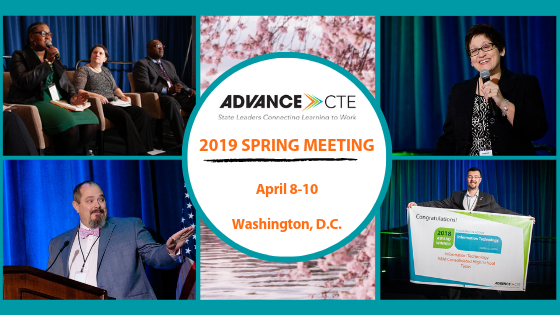
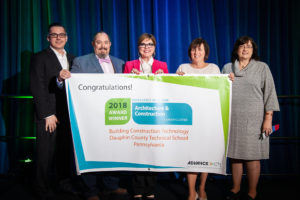 Advance CTE’s annual
Advance CTE’s annual 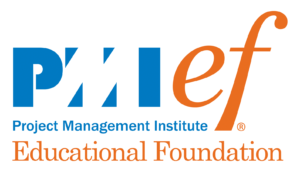
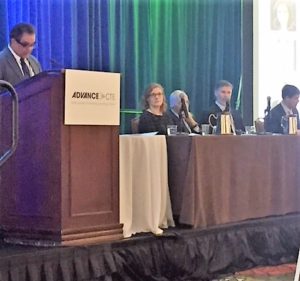 Within these themes, a number of interesting research questions emerged. In regards to student outcomes, for example, multiple groups inquired about CTE’s impact on student debt and whether it is actually accurate to make the claim that CTE program completion is associated with less student debt. While certain programs, such as the
Within these themes, a number of interesting research questions emerged. In regards to student outcomes, for example, multiple groups inquired about CTE’s impact on student debt and whether it is actually accurate to make the claim that CTE program completion is associated with less student debt. While certain programs, such as the 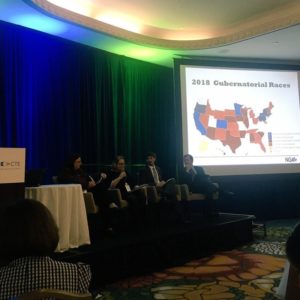 University’s Center on Education and the Workforce who discussed what “good jobs” are available – specifically those that pay a sustaining wage, offer pathways to advancement and are accessible to individuals with some college but less than a four-year degree – and who currently has access those good jobs. Through a moderated discussion with Chauncy Lennon of JPMorgan Chase & Co., who funded the “
University’s Center on Education and the Workforce who discussed what “good jobs” are available – specifically those that pay a sustaining wage, offer pathways to advancement and are accessible to individuals with some college but less than a four-year degree – and who currently has access those good jobs. Through a moderated discussion with Chauncy Lennon of JPMorgan Chase & Co., who funded the “
